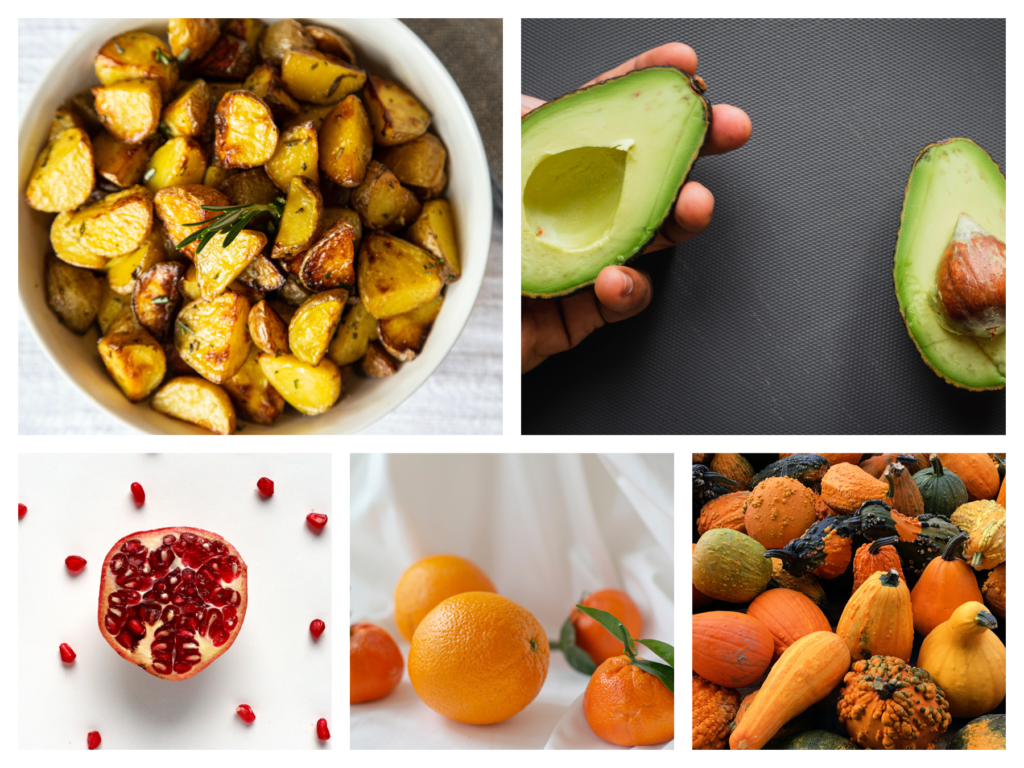Eating Seasonally – Winter Wins

It’s easy to think of fresh fruits and vegetables to eat during the summer months, but what about during winter? For much of the world, winter is a time where very little produce is grown. Thankfully, we have outstanding food systems that work to transport fresh foods from all over the world. Knowing which foods are in-season in warmer climates can be helpful when selecting the tastiest fruits and vegetables at the grocery store.
Athletes benefit from eating seasonally for a few main reasons:
- Increased variety in their diet
- Cheaper food prices
- Supporting a more sustainable food system
Eating Seasonally – Winter Wins
-
Pomegranates
Pomegranates are a delicious & unique fruit. They are full of fiber, antioxidants (vitamin C & E), and carbohydrates that are helpful for endurance athletes. Fiber improves gut health, cholesterol levels, and keeps you regular. Antioxidants help decrease inflammation build-up in the body. This is particularly helpful for athletes who experience muscle damage following hard workouts and races. Add some pomegranate seeds to your Greek yogurt parfait after a morning swim, and you’ll have a perfect carbohydrate to protein ratio.
-
Oranges
I love visiting friends and family in warm states like Arizona and California during the wintertime. The trees are full of fresh citrus fruits that taste like nothing you could ever get at the grocery store! Oranges are a fantastic food for endurance athletes due to their high vitamin C content. Vitamin C helps iron be better absorbed in the body. Endurance athletes commonly struggle with iron deficiency which can lead to feelings of fatigue & drowsiness. Snack on a fresh orange as a bedtime snack, paired with an iron supplement, or top a steak salad with fresh orange slices to help promote optimal absorption of iron.
-
Avocados
These bright green fruits are exceptionally delicious on sandwiches, tacos, salads, or crackers. Avocados are most well-known for their monounsaturated fatty acid content. In other words, it’s the kind of fat we all need and want more of in our diets. Fat of all kinds is an essential component of an athlete’s diet. Fat helps our body produce the hormones we need for increased energy, stable moods, regular periods, improved fertility, weight maintenance, better sleep, and so much more. Low-fat diets are linked to low levels of sex hormones (testosterone, estradiol, DHEA) in both men & women.
As an athlete, you are likely particularly sensitive to shifts in your hormone balance and may notice a difference in your ability to perform in workouts and races when your hormones are either too high or too low. Eating enough fat in your diet is a key way to promote that optimal hormone balance so that you can reach your potential as an athlete.
Avocados are also great sources of potassium, vitamin A, vitamin K, and fiber.
-
Potatoes/Squash
Potatoes and squash make for an excellent winter produce because of their long storage potential. In climates that grow potatoes and squash, they are typically harvested in the fall and will store for multiple months in cold & dry areas. Potatoes and squash are excellent sources of complex carbohydrates, fiber, potassium, and vitamin A (in sweet potatoes and orange-colored squash). They are extremely versatile & pair well with multiple dishes. Meat & potatoes is obviously an option, but I also love using potatoes and squash in a variety of cultural cuisines as well. Mediterranean sweet potatoes are one of my favorites.
-
Holiday goodies
Last but not least, we can’t talk about seasonal food without mentioning Thanksgiving and Christmas favorites! Apple pie, stuffing, cinnamon rolls, Trader Joe’s Peppermint Jojo cookies…the list goes on!
It’s good to remember that ALL foods fit in an athlete’s diet. Each food and nutrient has a purpose. Remind yourself of those purposes if you have a difficult time with certain foods. Calories = fuel for your workouts. Butter = fat to help your hormones. Sugar = carbohydrate to help your muscles recover from that holiday turkey trot.
Learning to be flexible with your food choices will more than likely make you a better, happier, athlete in general. You will be able to sustain higher levels of training and racing throughout your life if you are less rigid and perfectionistic about every piece of food that enters your mouth, particularly around the holidays. We all need the opportunity to relax and recharge, just as we do with training cycles, so that we are ready to go when it really counts. Consider the foods you eat this winter and be sure that you are eating seasonally with these winter wins.
Conclusion
Incorporating seasonal foods into your diet is an easy way to increase the variety of nutrients given to your body. This is one of the best ways to keep you feeling and performing at your best. Give a few of these winter options a try, and see which ones you like. Enjoy!
Enjoy!
References
- Seasonal Produce Guide / SNAP-Ed. https://snaped.fns.usda.gov/seasonal-produce-guide.
- https://fdc.nal.usda.gov/fdc-app.html#/food-details/169134/nutrients
- Soliman GA. Dietary Fiber, Atherosclerosis, and Cardiovascular Disease. Nutrients. 2019 May 23;11(5):1155. doi: 10.3390/nu11051155. PMID: 31126110; PMCID: PMC6566984.
- Elkington LJ, Gleeson M, Pyne DB, Callister R, Wood LG. Inflammation and Immune Function: Can Antioxidants Help the Endurance Athlete?. In: Antioxidants in Sport Nutrition. CRC Press/Taylor & Francis, Boca Raton (FL); 2015. PMID: 26065080.
- Vitamin C – Health Professional Fact Sheet. National Institutes of Health. https://ods.od.nih.gov/factsheets/VitaminC-HealthProfessional/. Updated March 26, 2021. Accessed Jun 2, 2022.
- Lane DJ, Richardson DR. The active role of vitamin C in mammalian iron metabolism: much more than just enhanced iron absorption! Free Radic Biol Med. 2014 Oct;75:69-83. doi: 10.1016/j.freeradbiomed.2014.07.007. Epub 2014 Jul 15. PMID: 25048971.
- https://fdc.nal.usda.gov/fdc-app.html#/food-details/171706/nutrients
- Mumford SL, Chavarro JE, Zhang C, Perkins NJ, Sjaarda LA, Pollack AZ, Schliep KC, Michels KA, Zarek SM, Plowden TC, Radin RG, Messer LC, Frankel RA, Wactawski-Wende J. Dietary fat intake and reproductive hormone concentrations and ovulation in regularly menstruating women. Am J Clin Nutr. 2016 Mar;103(3):868-77. doi: 10.3945/ajcn.115.119321. Epub 2016 Feb 3. PMID: 26843151; PMCID: PMC4763493.
- Ingram DM, Bennett FC, Willcox D, de Klerk N. Effect of low-fat diet on female sex hormone levels. J Natl Cancer Inst. 1987 Dec;79(6):1225-9. PMID: 3480374.
ADVERTISEMENT

Jackie Hendrickson RD, MPH is a registered dietitian with a Masters Degree in public health nutrition from Utah State University. Jackie is the owner of Enduura Nutrition and loves coaching her athletes to their athletic potential through sustainable training & nutrition principles. She is an avid road & trail marathoner with a background in collegiate track, cross country, and competitive swimming. Jackie and her husband, Adam, were teammates in college and continue to pursue their running goals together. They live in beautiful Ogden, Utah with their 2 year old son, Lincoln.









